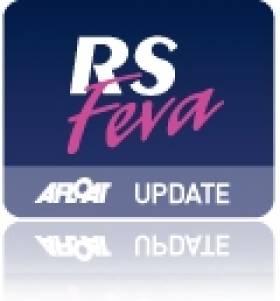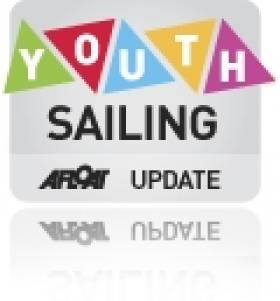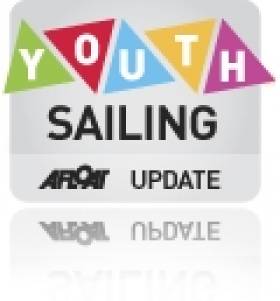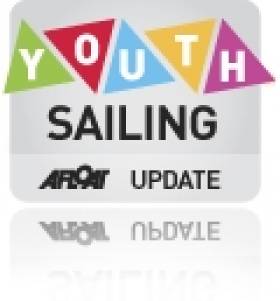Displaying items by tag: RS Feva Worlds
Irish sisters Kitty and Lily O’Halloran reached the podium twice at the RS Feva Worlds in Weymouth last week.
Based in Cornwall, the siblings race under the flag of Ireland — according to their father Donal, they only have Irish passports — and recently claimed the Irish title at the RS Feva Nationals in Dun Laoghaire, just weeks after finishing sixth overall (and first among females) at the UK Nationals in May.
They followed up that convincing victory with third place among female entrants and third among families (siblings) in the RS Feva World Championship 2022 at Weymouth and Portland National Sailing Academy, which concluded on Wednesday (27 July).
With their 17th placing overall out of 186 entries in Weymouth, not to mention their Southerns success in Monkstown Bay this past Easter, win Kitty and Lily are “adamant” to further represent Ireland on the international stage, Donal says.
Elsewhere at the Worlds, there were respectable results in the Bronze Fleet for the Ridout siblings out of Ballyholme Yacht Club, with Emily and Annabel finishing 24th and their brothers Matthew and Peter in 25th. Full results are HERE.
Places Filling Fast for 2013 RS Feva Worlds
#RSFeva - Entries for the 2013 RS Feva Worlds in Tuscany broke the 100 mark on Friday 1 February, as Yachts and Yachting reports.
More than five months remain till the start of the event at Marina di Grosetto, which runs from 19-26 July - but with just 180 places in total, the rush is surely on for Feva sailors to stake their claim.
So far 14 countries across three continents will be represented, with newcomers including the Czech Republic, Lithuania and Switzerland, while Los Angeles will also send a boat for the first time.
Full details of the event including entry forms and the Notice of Race are available vis the RS Feva Worlds website. The entry deadline is 30 June 2013 but with more than half the available spots booked already, there's no time to waste.
Here's hoping Ireland will be as well represented as we were in 2010, when 34 Irish Feva sailors took part in the Worlds at Carnac in France.
Irish Storm the Feva Worlds Top Six
A day of consistent results for Irish teams at Carnac yesterday saw the top six split evenly between British and Irish crews at the RS Feva Worlds.
Vicky Cudmore and Amy Harrington leapfrogged into third place, taking full advantage of the strong sea breezes which reached 20 knots during racing yesterday.
Top Irish boat overnight, Brendan Lyden and Marc Cudmore improved from seventh to sixth, but were also passed by the crew of Dermot Lyden and Peter Stokes, who now sit in fourth.
The top two boats enjoy a 31-point cushion ahead of the bronze, so the real race on today's final day of racing is for bronze, with third to sixth split by just nine points.
Full results are HERE.
Fevas Split into Silver & Gold
As the 140-boat fleet at the RS Feva World Championships splits into silver and gold, it's Brendan Lyden and Marc Cudmore who lead the Irish charge, seventh overall.
In a range of wind strengths yesterday, from 10 to 18 knots, it was the British pairing of Jack Hawkins and Christopher Thomas who put in the most impressive performance, recovering from an early stumble to 16th with two straight wins to finish the three-race day on the water on a high.
Eleven of Ireland's crews qualified for the gold fleet, an impressive achievement, and there are two more days of racing left.
Full results are here.
34 Irish Sailors at RS Feva Worlds
34 Young Irish sailors are taking part at the 2010 RS Feva Worlds, in Carnac, France.
The 140-boat fleet was broken into four groups for the first day of racing yesterday in 9-12 knots, with Irish crews in the top five in three out of four groups.
Racing continues today, with three races scheduled per day every day between now and Friday.
The event is being updated live on the RS Feva Worlds website, rsfeva.org/worlds and we'll bring you updated results on the Irish teams as they progress from the group stages to silver and gold fleets.

































































